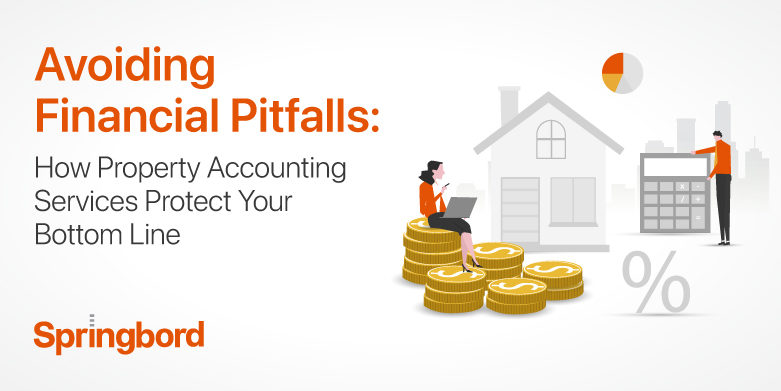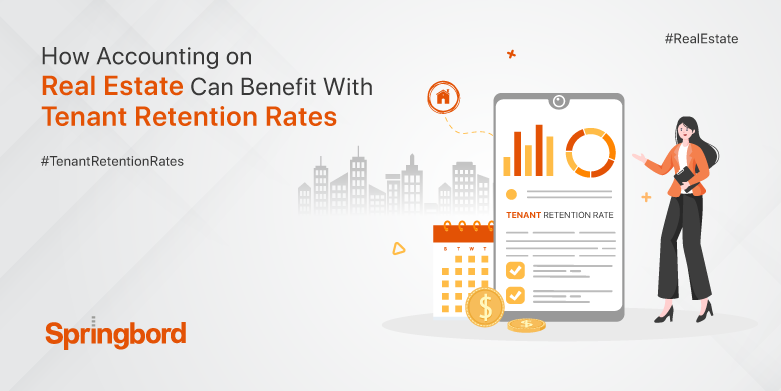 Read time 5 min
Read time 5 minManaging accounting in the real estate property management industry can be a daunting task.
From complex lease accounting to revenue recognition challenges, property managers face numerous accounting hurdles that can impact their financial management and overall business performance.
In this article, we will explore the common accounting challenges faced by real estate property managers and shed light on a strategic solution provided by Springbord that can help overcome these obstacles.
Discover how outsourcing accounting services through Springbord can revolutionize your financial management and unlock the true potential of your property management business.
Introduction:
The real estate property management industry plays a vital role in the housing market, ensuring the smooth operation and profitability of residential and commercial properties.
Effective accounting practices are crucial for property managers to maintain accurate financial records, make informed business decisions, and comply with regulatory standards.
However, managing accounting in the real estate industry comes with its fair share of challenges. In this article, we will delve into the common accounting challenges faced by property managers and discuss a game-changing solution to overcome these obstacles.
Understanding the Accounting Challenges in Real Estate Property Management
1.1 Challenge 1:
Complex Lease Accounting
Real estate property managers face significant challenges when it comes to lease accounting. The complexities arise from lease classification, measurement, and recognition. Determining whether a lease should be classified as an operating lease or a finance lease requires careful analysis of contractual terms and applicable accounting standards.
These complexities impact financial reporting and compliance. Failure to accurately classify leases can result in misstated financial statements and non-compliance with accounting regulations. Additionally, inconsistent or incorrect lease measurement and recognition can lead to errors, inefficiencies, and financial risks for property managers.
For example, lease liabilities and right-of-use assets must be correctly calculated and disclosed. Failure to do so can affect debt covenants, financial ratios, and investor confidence. Property managers must navigate through these challenges to ensure accurate financial reporting and compliance.
1.2 Challenge 2:
Revenue Recognition and Tenant Payments
Accurately recording and recognizing revenue is a significant challenge for real estate property managers. Issues often arise from tracking and collecting tenant payments, particularly when dealing with diverse lease structures and complex rent calculations.
Property managers face difficulties in handling rent escalations, lease renewals, and concessions. These processes require meticulous attention to detail to ensure that revenue is recorded correctly and in accordance with accounting standards. Failure to do so can result in revenue leakage, misreporting, and potential disputes with tenants.
Furthermore, revenue recognition and payment challenges directly impact cash flow management. Inaccurate or delayed recognition of revenue can hinder the ability to forecast cash flows accurately and make informed financial decisions. Property managers must address these challenges to maintain healthy cash flow and financial stability.
1.3 Challenge 3:
Expense Management and Cost Allocation
Tracking and allocating property expenses pose challenges for real estate property managers. Accurately assigning costs to specific properties or tenants requires meticulous record-keeping and efficient systems. Failure to do so can result in incorrect expense allocations, affecting financial analysis and budgeting.
Common area maintenance (CAM) charges and reconciliations add complexity to expense management. CAM charges, which cover shared expenses among tenants, must be allocated accurately to avoid disputes and maintain transparency. The reconciliation process can be time-consuming and prone to errors, leading to financial discrepancies and strained tenant relationships.
Expense management challenges directly impact financial analysis and budgeting. Inaccurate expense allocation can skew profitability analysis, hinder accurate budget forecasting, and impede decision-making. Property managers must overcome these challenges to gain a comprehensive understanding of property-level financial performance and make informed strategic choices.
By addressing these accounting challenges, real estate property managers can improve financial reporting accuracy, compliance, and overall operational efficiency. Outsourcing accounting functions to specialized service providers, such as Springbord, can offer a solution to these challenges. By leveraging the expertise and technology of outsourcing partners, property managers can streamline their accounting processes, reduce errors and risks, and focus on core business operations.
The Benefits of Outsourcing Accounting Services in Real Estate Property Management
2.1. Cost-Effectiveness and Expertise
Outsourcing accounting services for real estate property management offers significant cost advantages and access to specialized expertise. By partnering with a professional accounting service provider, property managers can eliminate the need for an in-house accounting team, reducing overhead costs associated with salaries, benefits, training, and infrastructure.
Moreover, outsourcing provides access to experienced accountants who possess in-depth knowledge of the real estate industry. These professionals understand the unique accounting challenges faced by property managers, such as complex lease accounting, revenue recognition, and expense allocation. Their expertise ensures accurate financial reporting and compliance with industry-specific accounting standards.
In addition to cost savings and expertise, outsourcing accounting services can increase operational efficiency. Service providers leverage technology and automation tools to streamline accounting processes, reducing the time and effort required for manual tasks. By eliminating administrative burdens, property managers can allocate resources more effectively and focus on strategic initiatives.
2.2. Enhanced Accuracy and Compliance
Accurate financial reporting is crucial for real estate property managers to make informed decisions and maintain stakeholders’ trust. Outsourcing accounting services can significantly improve accuracy in lease accounting and revenue recognition. Skilled accountants utilize sophisticated accounting systems and software to handle complex calculations and ensure precise and consistent results.
Compliance with accounting standards and regulations is another critical aspect of property management. Outsourcing accounting services provides access to professionals who are well-versed in the latest accounting regulations specific to the real estate industry. They stay up to date with changes in accounting standards, ensuring compliance and minimizing the risk of financial errors, penalties, and audits.
By entrusting accounting tasks to experts, property managers can have peace of mind knowing that their financial statements are accurate, reliable, and compliant with the necessary regulations.
2.3. Scalability and Flexibility
Property management businesses often experience periods of growth or fluctuations in their property portfolios. Outsourcing accounting services offers scalability and flexibility to accommodate these changes effectively.
As the number of properties managed increases, the accounting workload also grows. Outsourcing allows property managers to scale their accounting services without the need to hire additional staff internally. Service providers have the resources and capacity to handle increased volumes of accounting transactions, ensuring seamless operations during periods of growth.
Furthermore, outsourcing provides flexibility in adapting to changing business needs. Property managers can adjust the scope of accounting services based on their requirements, whether it’s adding new services or reducing existing ones. This flexibility allows property managers to respond quickly to market dynamics, portfolio changes, and evolving financial reporting standards.
Streamlined processes and access to advanced accounting software further contribute to scalability and flexibility. Outsourced accounting providers utilize efficient workflows and state-of-the-art software, enabling seamless integration with property management systems and improving data accuracy and reliability.
2.4. Focus on Core Competencies
Outsourcing accounting services empowers property managers to focus on their core competencies and strategic priorities. By delegating accounting tasks to professionals, property managers can devote more time and resources to essential aspects of their business.
Strategic decision-making becomes a primary focus when accounting services are outsourced. Property managers can analyze financial data, identify trends, and make informed decisions to optimize portfolio performance, negotiate leases, and allocate resources effectively. This strategic approach drives business growth and enhances profitability.
Moreover, outsourcing accounting services can improve tenant satisfaction and property management services. By streamlining accounting processes, property managers can allocate more resources to tenant relations, property maintenance, and customer service. This customer-centric approach strengthens tenant satisfaction, retention, and overall property value.
Conclusion
In conclusion, the challenges faced by real estate property managers in accounting can significantly impact their financial management and overall business performance. However, there is a strategic solution that can revolutionize the way property managers handle their accounting tasks.
By outsourcing accounting services, property managers can gain access to specialized expertise, enhance accuracy and compliance, achieve scalability and flexibility, and focus on their core competencies.
It’s time for the real estate property management industry to consider outsourcing as a strategic decision to enhance financial management and improve their business performance.
Take the leap and unlock the true potential of your property management business today. Contact Springbord, your trusted accounting service provider, to explore how outsourcing can transform your accounting practices and drive success in the dynamic world of real estate property management.







